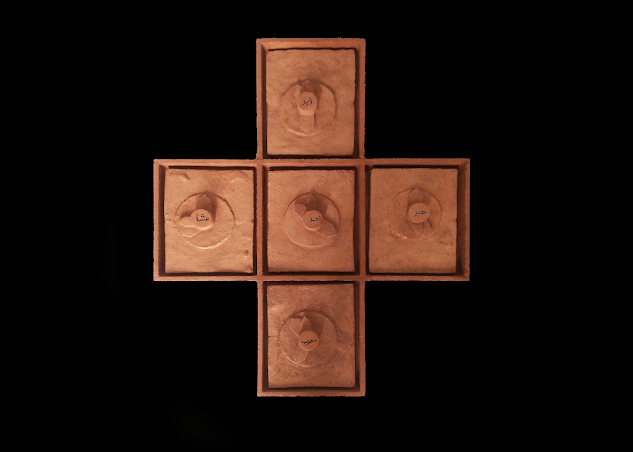Shahper born in 1984 is Syed
Sarvat Ali Jafri’s first given name. It means
“the feather in the shah’s crown” a name that descends from his
ancestral tradition and a lineage linking directly to the once glamourous Awadh
Empire of the 17th Century. His city, Faizabad - meaning the “City
of Gardens” in Persian – carries the scares of the lost glory where the
magnificent gates stand crumbling among collapsing palaces, temples,
mosques, boisterous souks and bazaars
that continue to thrive alongside the disintegrating Persian style
architectural wonders that once made the city a pearl of the east.
 |
| Waqt- e- namaz Size : 21×25 in Media : Sculpture = Clay, Cement, Wood Year : 2019 |
Faizabad despite its lost glory
remains the inspiration for Syed Ali Jafri’s multifaceted artistic practice. He
is one of a few contemporary artists residing in the city which is now home to
100 million people, many of whom are descendants of refugees from Punjab, Sind
and others far off lands that came to settle in the flourishing city over the
centuries.
The dramatic turning point for
Faizabad came on December 6th, 1992 when Hindu Nationalists destroyed the Babri
Mosque in Ayodhya - Faizabad, next door to the Artists’ centuries old family
home. Syed Ali witnessed the riots and the ensuing bloodbath firsthand and has
since lived through the subsequent rift and polarization this event caused
within his community. The riots - and the politics that flared them - split the
society like a surgical intervention
separating the syncretic culture of Hindus and Muslims and turned neighbours
into irreconcilable enemies, destined to live in proximity.
The political realities of caste,
creed and unemployment are powerful forces of destruction chipping away at the
few remnants of a common glorious past and is rewriting the city’s
history. The pain of Faizabad - visible on the city’s decaying walls - is
one Syed Ali shares with the abandoned structures of his town that mirror
history. A city built on artistic practice, a tradition of poetry and
philosophy is today, more than ever,
demanding that its inhabitants address the existing reality. The political party of India triumph in May 2019 declared the Hindu Nationalist project a priority and thus
once more reinvigorated religious hostilities that threaten to definitively
erase spaces that maintain a collective future.
Syed Sarvat Ali Jafri believes
that the only power at his disposal to confront the emerging political reality
is Art. His personal space is a form of dissent that is optimistic and inlaid
with aesthetics demanding to engage in peaceful communal conversation. Soliciting dialogue through visual scapes -
which is essential to the Ganga- Jamuni tradition of Avadh - aims to mellow the
schism of politics and community. He is adamant that the preservation of
what is left of his culture is urgently needed and he has thus devised multiple
innovative techniques, formats and conceptual principles to deal with local
complexities.
EXHIBITION : Garden Of Remembrance
“Our minds view the world through the prisms of philosophies we believe
in, mine is the wisdom of contesting conflict and bowing out of conflicts that
define humanity today.” Syed Sarvat
Ali Jafri
Syed Sarvat Ali Jafri draws on the
contemporaneity of the syncretic Islamic visual culture that he inherited
through his lineage that imbibed the visual elements of Hinduism and Sufism. He
comes from a tradition of Shia poets who used poetry as a form of a narrative
retelling of history and pain.
In this show he explores multiple
artistic formats that together constitute the different aspects of the
narrative of peaceful struggle against marginalization. His works conceptually
replaces the loss of 17 century architecture in his city to urban chaos,
politics and time. Accordingly, the Artist integrates architecture into his
creative vocabulary through the vantage point of his familiarity with the ruins
of Shia tombs, mosques, bazaars and city-gates that dot Faizabad.
'Sajdagah' or Turbah
Series of 18 Clay Tablets
Sculptures
For local Shi’ite families
scattered around the globe, the clay tablets known as 'Sajdagah'
or “turbah” - meaning soil in Arabic – represent soil from Iraq's
Shi'ite Muslim Karbala shrine. They are a blessing, an object of remembrance,
even a cure for sickness. The Karbala tablets or 'Sajdagah' are used during
prayers by Shia Muslims worldwide. They
embody the tradition of making shrines to Imam Ali and his family during the
month of Mohurrum and incorporate symbols such as the Panjatan, Taziya and
Taboot. Elements such as a water carrier, Hazrat Abbas's hand etc..
The tablets provide certain metaphors
of longing and restitution.
Syed Sarvat Ali Jafri innovated a
technique whereby he crushes the clay used to envelope cement tiles and wood as
a form of mortar to construct miniature shrines in ode to the lost architecture
and culture of Faizabad.
18Sculpture Clay works
3 Metal wheels
15 water colour Urdu Calligraphy
Through Urdu alphabet, names and
memories as well as Persian words that form a part of our local creole Syed Ali
Jafri constructs poetic narratives of resistance drawing from a tradition of
Persian and Urdu poetry which was once common in Faizabad.
Calligraphy writing being and
ancient form of art allows the artist to reanimate through a conceptual
practice the tenets of Islamic Visual Culture. Incorporating multiple aspects
of his ancestral traditions is a form of pacifist dissent against the growing
communalism that is rapidly overtaking Faizabad’s daily environment.
By
Jihan El - Tahri
Nippon
Gallery Presents
Solo
Show
Garden
of Remembrance
Recent
works
Syed
Ali Sarvat Jafri
Curated
by
Jihan
El – Tahri
Explore
Sculptures and Calligraphy
Sale
Starts Live
10
to 17 Jan 2021
www.nippongallery.com
On
- Screen display Solo show
-




